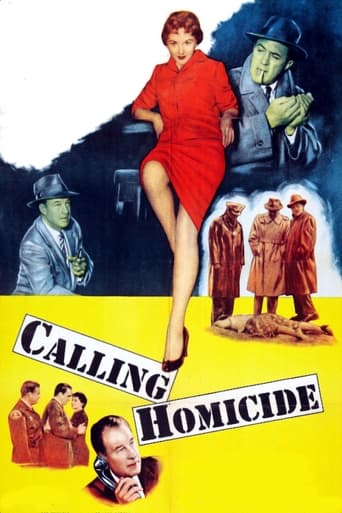JohnHowardReid
Wild Bill Elliott (Lieutenant Doyle), Don Haggerty (Sergeant Duncan), Kathleen Case (Donna), Myron Healey (Maddox), Jeanne Cooper (Darlene), Thomas B. Henry (Gilmore), Lyle Talbot (Tony Fuller), Herb Vigran (Ray Engle), James Best.Director: EDWARD BERNDS. Original screenplay: Edward Bernds. Photography: Harry Neumann. Film editor: William Austin. Art director: David Milton. Construction supervisor: James West. Music: Marlin Skiles. Production manager: Allen K. Wood. Assistant director: Edward Morey, Jr. Sound recording: Ralph E. Butler. An Allied Artists Production.Copyright 1956 by Allied Artists. No New York opening. U.S. release: 30 September 1956. U.K. release through Associated British-Pathe, floating from August 1957. No Australian theatrical release. 5,480 feet. 61 minutes.SYNOPSIS: A school for models serves as a front for baby-selling and blackmail.COMMENT: A cheap Monogram mystery with absolutely no redeeming features. The cast boasts only one halfway decent actor, namely Lyle Talbot, and it's difficult to judge which of Bernds' contributions are the less proficient: his slow-paced screenplay or his equally torpid direction. Personally, I'd give the booby prize to the script. Even the identity of the murderer is glaringly obvious.Calling homicide? I'd like to call it something else!
bkoganbing
Bill Elliott's third film working for the modern Los Angeles County Sheriff is this one Calling Homicide. Something not quite right about Elliott exchanging a horse for a squad car, but I guess it's a question of what I'm used to.This film has Elliott investigating the car bombing death of one of their own so it gets personal. One of the men tells Elliott he's new to the bunco squad, but he's investigating a racket he says is one sick and cruel one. The next thing is he's killed in the car bombing.Right after that the Homicide Squad gets assigned the death of a woman who may have driven off the canyon road to her death, but forensics proves it wasn't accidental. Oh, and her name was in the late cop's paperwork.The canyon victim was a former actress who ran a modeling agency and what this woman was really into as an income is pretty sickening. But as we meet people who knew her like Lyle Talbot, Tom Browne Henry, John Dennis, and Herb Vigran we get a picture of a greedy and overly ambitious woman.Same criticism I have of these other Elliott police films, nice but nothing here that wasn't on network television.
bmacv
An hour-long police procedural set in late-Chandler Los Angeles, Calling Homicide looks cheap and unstylish, like an episode of Perry Mason minus Raymond Burr, William Talman and Ray Collins (its cast is culled from from unsung bit-part players and brief-careered starlets, from veterans of crime programmers and Westerns – the lead goes to `Wild' Bill Elliott). But it has a Poverty-Row oomph to it and unfolds its story in a brisk, no-nonsense way.The L.A. Sheriff's Department gets hit by a doubled-barreled blast: One of its detectives is incinerated by a car bomb in the station's parking lot, while up in Coldwater Canyon a woman's body is discovered, mutilated like the Black Dahlia victim of a decade earlier. (The plot's roots stretch back to post-war Hollywood. A script girl identifies a photo as coming from Universal's The Crooked Mile; could she mean Republic's The Last Crooked Mile of 1946?) Galvanized into action, they identify the body as that of a former actress, now the ruthless proprietor of a `modeling' school – which turns out to be a cover for a black-market-baby (and blackmail) racket that the murdered detective had been investigating. There's no want of suspects, as they can't find anybody with a decent word to utter about the deceased. Still, nobody has the courage to sing; the few who consider it find themselves with very abbreviated futures....Far worse hours have been recorded on film than Calling Homicide, a stripped-down crime story that shows how closely related B-movies and television dramas had become in the late-1950s, though this Hollywood product shows a bit more edge and energy than would be thought suitable for living-room consumption for years to come.
django-19
CALLING HOMICIDE is one of the four police films in which former Western star "Wild Bill" Elliott played police detective Andy Doyle. These Allied Artists films were Elliott's last screen roles, and he certainly went out with a bang! The plot digs deep into the sordid underbelly of Hollywood in a way that Raymond Chandler would have been proud of (also reminiscent of such recent offerings as LA CONFIDENTIAL or TWILIGHT), but don't expect any Phillip Marlowe-esque flights of existential gutter-poetry-philosophy from Wild Bill Elliott, as he plays the role (and the role is written)in the stoic Gary Cooper vein. Like a good 1940s PRC mystery, this is a film where every supporting character is quirky and well-acted by such veterans as Lyle Talbot (wonderful as a drunk!), Myron Healey, James Best, and Mary Treen (who plays her role in the best Iris Adrian fashion). Interestingly, CALLING HOMICIDE was written and directed by Edward Bernds, veteran of many fine Three Stooges and Bowery Boys films. Bernds is a master of slapstick and comic timing, so it's a pleasant surprise to see him adapt so well to the hard-boiled crime genre. I'm going to check his filmography and track down any other crime dramas he may have written and/or directed. Good job, Mr. Bernds! The Andy Doyle police films were a nice swan song for Wild Bill Elliott--the western hero who best combined toughness with dignity. He was tough on the range, and he's just as tough on those mean streets of Los Angeles.
